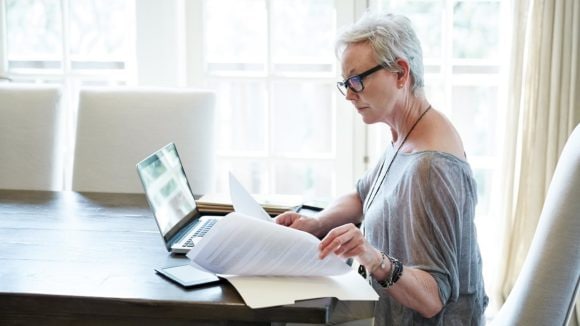
If you continue to work after you start receiving your pension, your taxable income may be higher than before you retired, putting you into a higher tax bracket. However, deferring receipt of your pension and continuing to pay into your pillar 3a account can make a considerable difference to your taxable income and is one way you can optimize your pension provision.
Postponing AHV
Postponing AHV
By deferring receipt of your AHV pension, you avoid paying the higher taxes that would result if you both work and receive an AHV pension. Please note that you must apply to defer your pension no later than one year after ordinary entitlement to a pension arises. Otherwise the AHV will begin paying out your pension and no deferment is possible. Deferring receipt of your AHV pension is recommended if, based on your health situation, it can be assumed that you will live to age 86 or longer. Deferring your AHV pension will increase the pension amount. If you defer it by one year, the amount will increase by 5.2%. If you wait five years, the increase will be 31.5%.
AHV deduction with nothing in return
AHV deduction with nothing in return
Many working people are unaware that they are still liable to pay AHV contributions if they continue to work beyond statutory retirement age. If you earn more than CHF 16,800 a year, the usual AHV, IV and loss of earnings contributions will still be deducted, without any entitlement to future benefits in return – these AHV deductions are treated as “solidarity contributions.”
Once someone reaches retirement age, the only contributions they are no longer required to pay are for those for unemployment insurance. As with the AHV, deferring your occupational pension will also lead to a lower income in the year in question and thus to a lower tax rate and a lower tax bill. In principle, you are not required to continue making contributions once you reach retirement age. However, if you want to continue working then, depending on the pension fund, you can defer receipt of your pension until you turn 70 and receive a higher pension as a result. Check the regulations of your pension fund in advance to review the possibility of deferring your pension fund benefits.
Continue making pillar 3a contributions
Continue making pillar 3a contributions
Pillar 3a is another way you can reduce your taxable income if you continue to work after reaching normal retirement age. If you carry on working, you can continue to make pillar 3a contributions, up to age 69 for women and age 70 for men. If you are part of a pension fund, you may contribute up to 7,056 francs (as of 2024) to a pillar 3a account, the same amount as before retirement. For persons who no longer pay into a pension fund, one fifth of the annual net salary can be contributed (up to a maximum of 35,280 francs).
If you continue to work after retirement, you can obtain a higher annual pension from pillar 1 by deferring payment of your AHV pension. If you belong to a pension fund, you will continue to build up capital in pillar 2, which will also lead to a higher pension later on. You can also continue to use pillar 3a to improve your private pension provision and reduce your tax burden.
Capital or pension?
Capital or pension?
At the latest three years before you reach normal retirement age, you should consider whether you want to receive your pension fund savings as a lump sum or as a monthly pension. A mixture of the two is also possible. In addition, check with your pension fund whether you can have only the non-mandatory part paid out as capital, while drawing the mandatory part as a pension.
The general rule of thumb is that your current expenses should be covered by current income such as pension, investment income or other regular income. You can use capital for larger projects or purchases or pass it on to your relatives. Often, the right answer to the question “capital or pension?” is a combination of the two. In the case of married couples, for example, one person could receive the pension and the other the capital.
It is important to stagger payouts from a pension fund and pillar 3a capital. If you receive all of the money in the same year, your tax bill will be higher due to a higher tax rate. And you should have a clear investment strategy for unused capital. If you are unsure about the ideal combination of capital and pension for you, our UBS client advisors will be happy to assist you.




